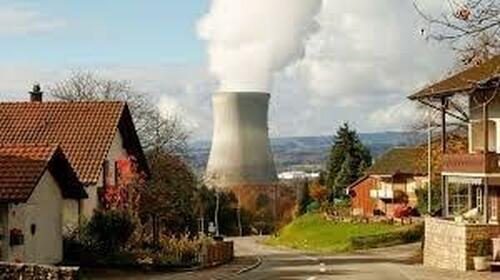
In the beginning of July, the Paul Scherrer Institute (PSI), Switzerland’s largest research institute for natural and engineering sciences, and Copenhagen Atomics, a Danish molten salt reactor developer, announced their large-scale experimental collaboration. The four-year agreement stands to put Europe in the pole position of the advanced nuclear technology field.
The Paul Scherrer Institute (PSI) and Copenhagen Atomics have now publicly announced their collaboration agreement on a thorium molten salt critical experiment.
Aslak Stubsgaard, a co-founder of Copenhagen Atomics, writes in their press release: ‘We’ve spent nearly a decade perfecting our thorium molten salt reactors, and now, we are ready to test them in a real-world setting.’ Beyond the goal of validating the technology, the experiment will provide valuable experience for the design, construction, licensing, operation, and decommissioning of the new technology and help collect data for commercial deployment.
And, with the Paul Scherrer Institute (PSI) as Copenhagen Atomics’ research partner, this milestone experiment will happen right here, in Switzerland! The PSI conducts their research in the fields of energy and climate, future technologies, health innovation, and fundamentals of nature. They operate a hot laboratory which, as equipped for research and work on radioactive materials, provides the
perfect testing venue for the thorium molten salt critical experiment which is scheduled for 2026. Marco Streit, head of PSI Hot Laboratory, states: ‘This experiment is a critical step towards new advancements in nuclear energy.’
Affordable, Clean, Dependable Energy
With the help of this collaboration, the Copenhagen Atomics technology ultimately has the potential of becoming one of the world’s most affordable, dependable, and clean energy solutions; it could truly revolutionize the energy sector and have a huge positive impact in general. After all, as Copenhagen Atomics’ slogan rightfully states: Energy does equal prosperity.
According to Thomas Jam Pedersen, co-founder of the Danish company, they will be able to produce electricity for only 20 dollars per megawatt hour, assuming regulatory burdens are kept within reason. And, the first commercial reactor could be ready as soon as 2028.
Our regular readers will likely remember Mr. Pedersen from our Fireside Conversation in April. At the time he was in Switzerland to present Copenhagen Atomics and their thorium molten salt reactor technology to a group of Swiss entrepreneurs, politicians, and other decision-makers, co-organized by BFI. He also met with the PSI, and now that very collaboration he was working on has come to fruition!
Modern nuclear technologies have nothing to do with Fukushima
Unfortunately, the stigma of past disasters with nuclear reactors has caused many to overlook the fact that nuclear technologies have advanced far, especially when it comes to safety, waste production and efficiency. In his Fireside Conversation with our Frank R. Suess, Thomas Pedersen explains how new technologies, specifically the one from Copenhagen Atomics, no longer resemble the ones we associate with Fukushima.
Collaborations like that between Copenhagen Atomics and PSI will help solidify the importance for the research into nuclear technology and the role it can play for us all in the future. We’ll make sure to keep you posted about these exciting developments happening only one hour from our Zurich offices!
In the beginning of July, the Paul Scherrer Institute (PSI), Switzerland’s largest research institute for natural and engineering sciences, and Copenhagen Atomics, a Danish molten salt reactor developer, announced their large-scale experimental collaboration. The four-year agreement stands to put Europe in the pole position of the advanced nuclear technology field.
The Paul Scherrer Institute (PSI) and Copenhagen Atomics have now publicly announced their collaboration agreement on a thorium molten salt critical experiment.
Aslak Stubsgaard, a co-founder of Copenhagen Atomics, writes in their press release: ‘We’ve spent nearly a decade perfecting our thorium molten salt reactors, and now, we are ready to test them in a real-world setting.’ Beyond the goal of validating the technology, the experiment will provide valuable experience for the design, construction, licensing, operation, and decommissioning of the new technology and help collect data for commercial deployment.
And, with the Paul Scherrer Institute (PSI) as Copenhagen Atomics’ research partner, this milestone experiment will happen right here, in Switzerland! The PSI conducts their research in the fields of energy and climate, future technologies, health innovation, and fundamentals of nature. They operate a hot laboratory which, as equipped for research and work on radioactive materials, provides the
perfect testing venue for the thorium molten salt critical experiment which is scheduled for 2026. Marco Streit, head of PSI Hot Laboratory, states: ‘This experiment is a critical step towards new advancements in nuclear energy.’
Affordable, Clean, Dependable Energy
With the help of this collaboration, the Copenhagen Atomics technology ultimately has the potential of becoming one of the world’s most affordable, dependable, and clean energy solutions; it could truly revolutionize the energy sector and have a huge positive impact in general. After all, as Copenhagen Atomics’ slogan rightfully states: Energy does equal prosperity.
According to Thomas Jam Pedersen, co-founder of the Danish company, they will be able to produce electricity for only 20 dollars per megawatt hour, assuming regulatory burdens are kept within reason. And, the first commercial reactor could be ready as soon as 2028.
Our regular readers will likely remember Mr. Pedersen from our Fireside Conversation in April. At the time he was in Switzerland to present Copenhagen Atomics and their thorium molten salt reactor technology to a group of Swiss entrepreneurs, politicians, and other decision-makers, co-organized by BFI. He also met with the PSI, and now that very collaboration he was working on has come to fruition!
Modern nuclear technologies have nothing to do with Fukushima
Unfortunately, the stigma of past disasters with nuclear reactors has caused many to overlook the fact that nuclear technologies have advanced far, especially when it comes to safety, waste production and efficiency. In his Fireside Conversation with our Frank R. Suess, Thomas Pedersen explains how new technologies, specifically the one from Copenhagen Atomics, no longer resemble the ones we associate with Fukushima.
Collaborations like that between Copenhagen Atomics and PSI will help solidify the importance for the research into nuclear technology and the role it can play for us all in the future. We’ll make sure to keep you posted about these exciting developments happening only one hour from our Zurich offices!
Loading…





